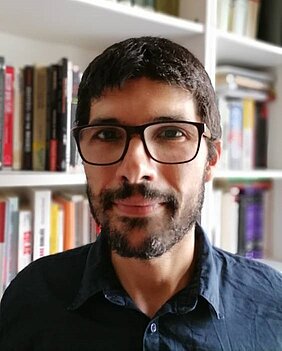Gastwissenschaftler am Lehrstuhl
06/10/2022Ende Juni / Anfang Juli wird Dr. Stefano Pisu (Assistant Professor of Contemporary History, University of Cagliari) zu einem dreiwöchigen Aufenthalt als Gastwissenschaftler an den Lehrstuhl kommen.
During his research stay at the Lehrstuhl für Literatur und Kultur Russlands at JMU Würzburg Professor Stefano Pisu will work on a research project focused on how the Russian past (mainly Soviet, but also Tsarist) was represented (valued, denied and/or renegotiated) in 1990s Russia through cinema. The project aims to understand whether and to what extent film production of that period contributed to shaping Russian national identity in the Yeltsin era that followed. Scholarship on the debate about the role of the Soviet past in post-1991 Russia has outlined how the topic of memory had already been discussed in the Gorbachev years when memoirs on Stalin’s mass repression were openly published. In the early 2000s, political scientists and historians started studying how the 1990s political struggle between Yeltsin and loyal preservers of the old regime made the use of the past a battleground for contending ideas of what it means to be Russian and what might be “usable” for the new national identity. Meanwhile, film scholars using a cultural approach have stressed the importance of post-Soviet films set in past times to understand how the cultural representation of “Russianness” has changed over the years. However, all of these studies are strongly focused on film language discourse, while only minimal attention has been paid to the possible social and political reception and impact of those films in the public sphere. Stefano Pisu’s project addresses this gap in the research landscape. Using 1990s Russia press collections, Professor Pisu will explore the extent to which films and film reviews stimulated a public debate about the Soviet past and the (re)construction of a post-Soviet Russian identity as well as potentially in relation to the long Tsarist era.
During his research stay, Stefano Pisu will give a lecture on the history of Italian-Soviet film co-productions in order to show how this case study may help to understand the complex history of East-West relations – and not just cultural relations– during the Cold War. Moreover, Professor Pisu will discuss further collaborations with the Lehrstuhl für Literatur und Kultur Russlands in order to establish student and academic exchange projects between the two universities.
Stefano Pisu is Assistant Professor in Contemporary History at the University of Cagliari (Italy). His main research fields are: the history of international cultural relations in the XXth century, mainly, but not exclusively through cinema (history of international film festivals and co-productions, with a focus on the USSR case); and the political and cultural history of Soviet film. In 2020 he was International Fellow at TORCH (The Oxford Research Centre in the Humanities) of Oxford University. He is the principal investigator of the Italian research group for the trilateral Italian-French-German conference series Le scuole di cinema nel XX secolo: circolazioni artistiche, sociabilità politiche e reti professionali, sponsored by the DFG, FMSH and the Italian-German Centre for the European Dialogue at Villa Vigoni, Como (2021-2023). From the French side, Caroline Moine and Gabrielle Chomentowski coordinate this project. German coordinator of the conference series is Gesine Drews-Sylla, Professor and Department Chair for the Literature and Culture of Russia at the University of Würzburg. The plan for Pisu’s research stay in Würzburg was developed within the framework of this cooperation.
Professor Pisu is also a member of the executive board of AISSECO (Associazione Italiana per lo Studio della Storia dell’Europa Centrale e Orientale). He published four monographs and numerous articles and book chapters. One of his latest publications is “New Perspectives on The Parajanov Affair: The Role of Italian Activism in the Transnational Campaign for His Release”, in A. Clech, D. Healey, F. Stella (eds.), Sexual and Gender Dissent in the USSR and Post-Soviet Space, special issue of “Cahiers du Monde Russe”, 62/2-3, April-September 2021, pp. 443-472.



